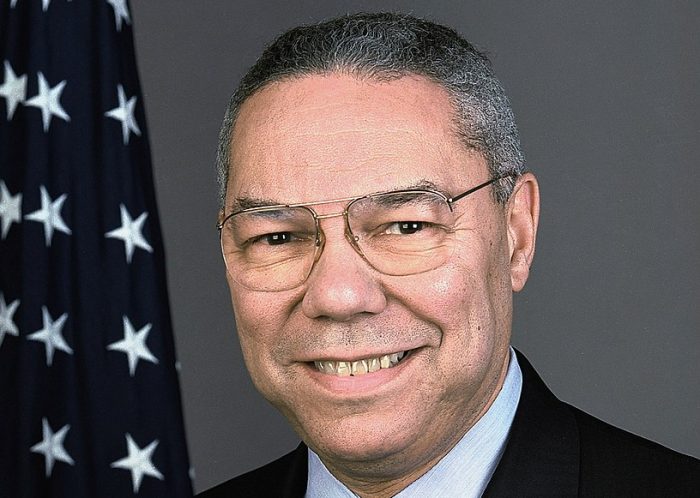Colin Powell, a respected secretary of state and military leader
“Great leaders are almost always great simplifiers, who can cut through argument, debate and doubt, to offer a solution everybody can understand.”
Those were the words of respected military and government figure, former Secretary of State Colin Powell (R), who passed away Oct. 18 as a result of COVID-19 complications amid a cancer battle. A leader who reached the peak of his military career, he grew up with humble roots. Born on April 5, 1937, in Harlem to Jamaican immigrants, Powell lived within the difficult surroundings of South Bronx. As a young man, he witnessed a great deal of crime, drugs and a lack of opportunity within this part of New York City. Later in life, Powell served as a key spokesperson for a national mentoring organization that helped children who lived within at-risk areas to reach their fullest potential.
Graduating high school, Powell enrolled with City College of New York, where he was accepted into the Reserve Officers’ Training Corps. Right away, he was drawn to the military discipline, liked wearing a distinctive uniform and performed well within an early team setting. Powell attained the rank of cadet colonel and led the drill and ceremony team for his college’s military program. By 1958, he graduated college and began his long and distinctive career within the Army.
Powell served with distinction on two tours of duty in Vietnam from 1962-63 and 1968-69. He saw the start of the escalation of the war in Southeast Asia, and was present for the Tet Offensive. He observed the protests that were organized against the American government’s support of the war. Wounded twice, he saved two other soldiers after a helicopter crash.
He was highly decorated, including the Purple Heart, for his combat and leadership in South Vietnam.
This officer from the mean streets of South Bronx began his climb through a series of political jobs that were tied to the military. While he was a combat veteran, it was perceived by his superiors that he had the ability to guide the armed forces during times of peace and war. Powell was respected for his calm and confident approach which was easy to follow. He attended the U.S. Army Command and General Staff College, and gained his master’s degree at George Washington University.
After being promoted to major, he won a White House Fellowship and was assigned to the Office of Management and Budget during the administration of President Richard Nixon (R). By 1979, Powell began his rise within senior leadership.
Powell’s education, training and experience prepared him well for senior military and government positions. This climb of promotions and responsibilities was evident when he advised former Secretary of Defense Caspar Weinberger (R). By 1987, Powell became national security adviser for President Ronald Reagan (R).
With Powell being a combat veteran, it was no surprise that he would eventually command the armed forces during times of peace and war. He was commander of Army Forces Command during the fall of the Soviet Union and the Berlin Wall in 1989 and was now a four-star general. In October of that year, President George H. W. Bush (R) appointed Powell as the first African American officer to be chairman of the Joint Chiefs of Staff, the highest military position in the Department of Defense.
Powell led the military during the invasion of Panama in December 1989 through January 1990 to depose its leader, Manuel Noriega. This strategically located country between North America and South America dealt drugs, and the United States feared for the stability of the Panama Canal. American soldiers quickly took over the country, deposed Noriega and demonstrated the willingness of the U.S. government to intervene within Latin American affairs. Powell also oversaw the beginning operations of the U.S. military intervention in Somalia. The hope was the U.S. could bring humanitarian aid, comfort, food and stability to this strategic but troubled East African nation that was in the midst of a civil war.
Persian Gulf War
Perhaps within his career, the strongest role that Powell oversaw was the Persian Gulf War in 1990-91. Under its president, Saddam Hussein, Iraq invaded its neighboring oil-rich nation, Kuwait, and quickly overran its forces, taking control of the small country on the Persian Gulf. Hussein had the fourth largest military in the world and there were the concerns that he would invade Saudi Arabia with its vast oil reserves. Under the direction of Bush, American soldiers were quickly sent to Saudi Arabia to protect the kingdom under the name of Operation Desert Shield.
Usually standing next to Bush, Powell had a direct and easy approach toward identifying the military objectives of the United States and the growing coalition of foreign military forces. For several months, he worked with nations around the world, including those Arabic countries from the Middle East to thwart the tyranny of Hussein. Before the land war started, there were some 750,000 coalition forces, with the United States as the most dominant partner with 540,000 armed forces, many stationed in Saudi Arabia.
At first, Bush hoped that air power would be enough to dislodge the Iraqi army, without committing a large amount of soldiers. The president feared excessive casualties through the strength of the Iraqi army and its known use of biological and chemical weapons. Powell understood the concerns of Bush, but he was tasked with creating a plan that would succeed in ending this conflict and restoring the previous leadership of Kuwait. Looking at the president, Powell with Gen. H. Norman Schwarzkopf at his side outlined the plans.
Powell provided Schwarzkopf with abundant resources that comprised a superior military force created within the post-Cold War world. In the background, the former Soviet leaders must have openly wondered how they would have fared within a conventional war against the United States and the major nations of the West.
At the head of this massive force was Powell and many other senior military figures who wanted to gain a victory in order to preserve peace in this region and to also end the negative stigma over the American loss of the Vietnam War. Many of these officers were older leaders who had served in Vietnam, and were pleased to oppose the Iraqi military.
Always a firm figure, Powell was the architect of a military force that was transported thousands of miles away and equipped for desert warfare. After several long months of waiting, the coalition was poised to move into Kuwait and Southern Iraq.
The Allied air war destroyed the Iraqi air force, tanks, troops and Scud missile sites which targeted Saudi Arabia and Israel. That Thanksgiving, Bush, a former aviator of World War II in the Pacific, and Powell traveled to Saudi Arabia to meet Schwarzkopf.
After the holidays, time ran out for Hussein who refused to pull out of Kuwait. Operation Desert Storm began Jan. 17, 1991, through the roots of the plans that Powell and Schwarzkopf created to defeat the well-entrenched enemy. American armor and aircraft “blitzkrieged” Iraqi positions in Kuwait and Southern Iraq. Aggressively, they cut off and destroyed any chance of the Iraqis from being resupplied, and prevented an easy retreat away from the fighting. Inside of three days, the war was over. The Iraqi forces fled, were captured and killed during this short, but intense war.
And so Powell guided these operations that successfully obliterated the presence of Iraq in Kuwait. This local hero from meager beginnings did not attend the United States Military Academy at West Point. However, he often saw many younger officers and soldiers from the inner cities who reminded him of his own background. The immense American strength during the Persian Gulf War shocked our friends and foes toward the swift resolve of this country to carry out large-scale fighting.
Secretary of state
Retiring from the military in 1993, Powell soon joined the Republican Party, and later served as the first African American secretary of state from 2001 to 2005 for President George W. Bush (R).
Powell made the controversial case which tried to persuade Americans that Hussein had weapons of mass destruction in Iraq after 9/11. As in the military, Powell was respected by his foreign counterparts as a secretary of state directing American foreign policy overseas. He went against the Republicans in 2008 to endorse the election of the first Black president, Barack Obama (D).
A man who positively operated in the background, Powell could be considered to be this generation’s equivalent of Jackie Robinson, Thurgood Marshall, Rosa Parks and Hank Aaron. Through his regular approach, Powell broke the color barrier through his military and political accomplishments. And within his many decades in uniform, he was one of the most trusted American military and government leaders representing the strength of this nation. Powell passed away at age 84, and is survived by his wife Alma and three children.
Rich Acritelli is a social studies teacher at Rocky Point High School and an adjunct professor of American history at Suffolk County Community College.
Rocky Point High School students Giana Imeidopf, Sean Hamilton and Zachary Gentile helped with this article.







